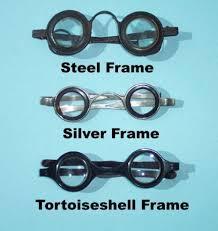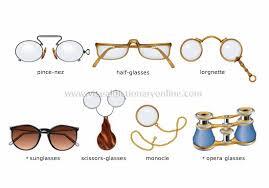
In the beginning was the word, and the word was blurry. That’s because eyeglasses hadn’t been invented yet. If you were nearsighted, farsighted or had an astigmatism, you were out of luck. Everything was blurry.
It wasn’t until the late 13th century that corrective lenses were invented and crude, rudimentary things they were. But what did people whose vision wasn’t perfect do before that?They did one of two things. They either resigned themselves to being unable to see well, or they did what clever people always do. They improvised.The first improvised eyeglasses were makeshift sunglasses, of a sort. Prehistoric Inuits wore flattened walrus ivory in front of their faces to block the sun’s rays.
In ancient Rome, the emperor Nero would hold a polished emerald in front of his eyes to reduce the sun’s glare while he watched gladiators fight.His tutor, Seneca, bragged that he read “all the books in Rome” through a large glass bowl filled with water, which magnified the print. There’s no record as to whether a goldfish got in the way.
This was the introduction of corrective lenses, which was advanced, a bit, in Venice around 1000 C.E., when Seneca’s bowl and water (and possibly goldfish) were replaced by a flat-bottom, convex glass sphere that was laid on top of the reading material, becoming in effect the first magnifying glass and enabling the Sherlock Holmes of medieval Italy to gather numerous clues to solve crimes. These “reading stones” also allowed monks to continue to read, write, and illuminate manuscripts after they turned 40.
Chinese judges of the 12th-century wore a type of sunglasses, made from smoky quartz crystals, held in front of their faces so their expressions couldn’t be discerned by witnesses they interrogated, giving the lie to the “inscrutable” stereotype. Although some accounts of Marco Polo’s travels to China 100 years later claim that he said he saw elderly Chinese wearing eyeglasses, these accounts have been discredited as hoaxes, since those who have scrutinized Marco Polo’s notebooks have found no mention of eyeglasses.
Although the exact date is in dispute, it is generally agreed upon that the first pair of corrective eyeglasses was invented in Italy sometime between 1268 and 1300. These were basically two reading stones (magnifying glasses) connected with a hinge balanced on the bridge of the nose.
An important breakthrough came in the early 16th century, when concave lenses were created for the nearsighted Pope Leo X. Now eyeglasses for farsightedness and nearsightedness existed. However, all of these early versions of eyeglasses came with a major problem – they wouldn’t stay on your face.
So Spanish eyeglass manufacturers tied silk ribbons to the lenses and looped the ribbons on the wearer’s ears. When these glasses were introduced to China by Spanish and Italian missionaries, the Chinese discarded the notion of looping the ribbons at the ears. They tied little weights to the end of the ribbons to make them stay on the ear.
Eyeglasses styles come and go, and as is frequent in fashion, everything old eventually becomes new again.


评论
发表评论